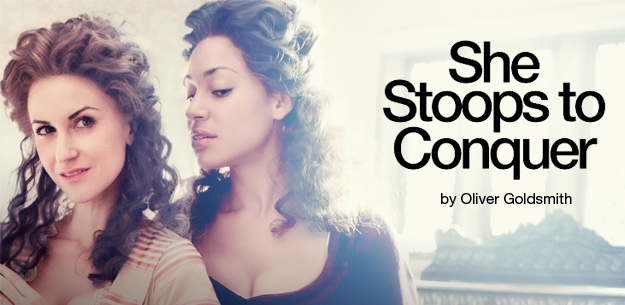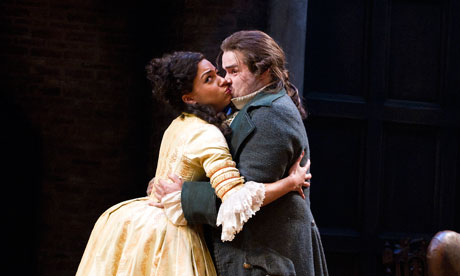I braved my dislike of the National, namely that the building is uglier inside than it is outside and I am always getting static electric shocks from every surface and went to pay my respects to Goldy.
I suppose the real test of a good performance is if you feel a driving desire to read the script after the performance, so I suppose the fact that I nearly missed my stop due to reliving the production was a good sign.
The story is a rather typical knockabout. Our hero is Charles Marlow, he is a man who is an energetic roister-doisterer, with a knack for a quick quip - until he talks to a lady of his own class, then he is a stuttering idiot. He and his friend Hastings have gone into the country to meet Kate Hardcastle, the lady his father wants him to marry and he knows he will make a cod’s ear of it.
On the way, he gets lost, and walks into the pub where Tony Lumpkin, Kate’s half-brother, decides to amuse himself by sending the London fops to his father (and Kate’s) house and telling them it’s an inn. The men then behave atrociously to Mr Hardcastle, condescendingly to his wife and Charles flirts with Kate because he thinks she is the barmaid. She is actually rather happy about this, longing to be treated with something other than polite diffidence. After much confusion and silliness, all is sorted out and everyone but the avaricious Mrs Hardcastle ends up happy.
However, this is not just any play, it’s a Goldsmith play and every line is a well oiled and flexible whip of sound with nearly every joke striking as true now as over two hundred years ago. I think it would be hard to perform this play badly, as smoothly written as it is. I have rarely seen a play where I wanted to play every part, even the servants.
Katherine Kelly played Kate. She is the dutiful daughter, but she crackles with independence and fire, her willingness to play along with Marlow’s delusions, her pleasure in affecting a ‘barmaid’s demeanour’, a part played with extra relish by the actress as she has just finished a several year stint on Coronation Street where she played a barmaid. Yes, she is a dutiful daughter, but she is a dutiful daughter who announces, ‘I considered your commands as my pride; for your kindness is such, that your duty as yet has been my inclination.’ My kind of dutiful.
Marlow was also enjoyably played, his voice reminded me a bit of Hugh Laurie in ‘Blackadder’, he veered between incredible shyness and extreme boldness, depending on who he thought he was talking to. I thought the scene where he shyly tried to talk to Kate when he saw her as a lady of distinction and she had to make up the majority of his half of the conversation was very funny, especially as he was trying to squeeze out the door and she kept calling him back. I think the secret of the character, that whether he is bold or shy, he is a loser. Indeed the more he boasted of his rakish ways, the more un-rock-n-roll he seemed, he was a man waiting, wanting, wishing to be settled down and I think he will make a very pleasant husband. Certainly Kate will be the brains of the outfit.
Marlow’s friend Hastings, was a camper, dandier and more exuberant gentleman. I also enjoyed his performance most, if just because he seemed to be having such a good time. Near the beginning of the play, he and Marlow were chatting and munching fruit, and the splatters from Hasting’s apple hit Marlow in the eye, setting the acting giggling. This was thoroughly in keeping with the character and was very charming. At another point, he comes out into a dark wood to wait for Tony Lumpkin and tells himself that he is an idiot. This line could be a rather bland one, but the pause the actor left in it let the audience laugh their agreement. I also thought the shade of his coat a lovely blue.
Mr Hardcastle was played by Steve Pemberton, and as a fan ‘League of Gentlemen’ and ‘Psychoville’ I was pleased to see him. He played the part of a man who ‘loved old things’ very well. I also enjoyed the way he played the obviously furious man trying to keep his temper. However, there was nothing in the performance he hasn’t done in his telly work, so although he was very entertaining, he wasn’t surprising.
Much more surprising was his wife Mrs Hardcastle, played by Sophie Thompson. The character is a vain, greedy lady who has never been to London but gets all the magazines and so has constructed her own imaginary London for herself. This gave occasion to lots of yokel/London jokes that still go down well and also allowed her to have the most extraordinarily odd accent I have ever seen on a stage. It was a farmer’s wife’s attempt at posh and allowed her to stretch and twist her lines in all kinds of strange directions. This was very funny at times, but I have to admit, she was the only character I did get tired with.
Tony Lumpkin got my favourite scene of the night, when a letter about a very secret assignation is given to him when the lady who should not hear the contents, and the one who should, are both in the room. The trouble is, he can’t read. He can recognise the name on the front well enough, but when he opens the letter, all he sees is ‘buzz’, which he considers a pity, because ‘the inside of a letter is always the cream of a correspondence.’ So he gives it to the wrong lady to read and all hell breaks loose.
(Constance Neville: Cush Jumbo and Tony Lumpkin: David Fynn)
- All in all, I found the play so smoothly written and the actors enjoying themselves and playing not only to the type of character but to the nuances Goldsmith has added. On top of this, the scene changes are covered by scat singing servants, who at one point do a bit of percussion with pots and pans. I liked these bits, the music really suited the play very well, and it added a fun bit of texture (watch the linked video for a hint of the music). Also, one of the servants in the house would also be my perfect Corporal Trim were I to make a play of Tristram Shandy.
However, I do have one problem with the play itself. The central conceit is that Marlow thinks Harcastle is an innkeeper and treats him appropriately. Having worked ‘below stairs’ at a pretty shabby hotel, it makes me pretty uncomfortable about how it is okay to be boorish and rude at an inn, but not a gentleman’s and that all the characters think that acting like a rude idiot is fine if you think you are paying for the privilege. My experience at the hotel has taught me not much has changed in that respect.




No comments:
Post a Comment